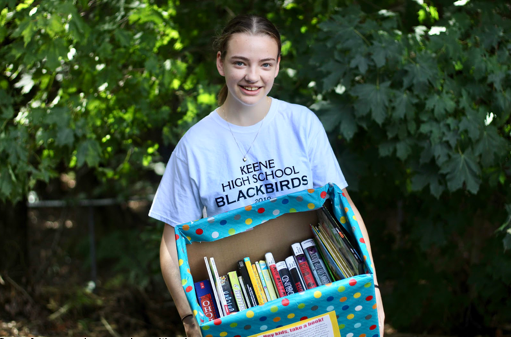
Amelia Opsahl, a Keene, New Hampshire high school student, founded Reading on the Road, an initiative to put books on school buses and ensure all kids have access to books. CLiF donated books for the program, and we talked to Amelia about the difference she and her partners have already made for kids in her community.
Q. Can you describe Reading on the Road, its goals, and successes you’ve had so far?
Reading on the Road strives to improve literacy and cultivate enthusiasm for reading by making books more accessible to all children. We do this by collecting children’s books through donations in our area and distributing them onto elementary school buses in the SAU 29 and SAU 60 school districts. We currently have over 550 books circulating on buses and over 1,000 more in storage. As we collect more books, we hope to expand to outlying towns in these school districts. Kids are allowed to either browse the books while they ride the bus or take them home to keep. In doing this, we hope to not only encourage healthy reading habits and provide easy access to books for children who may not have them otherwise, but also decrease disruptive behavior on school buses, which has become a prevalent issue in school systems today.
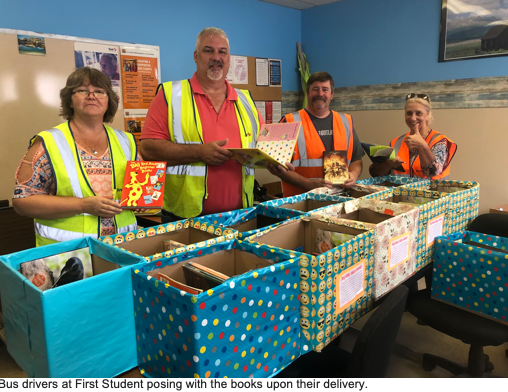
Q. How were you inspired to start this program?
After observing the positive impacts of a similar program through Alstead Public Library, who has been giving their discards to elementary school bus drivers in the SAU 60 school district for several years, we thought it would be helpful to bring it into our own school district.
Q. How did you go about implementing it? Who are your partners?
Ever since our program was approved by the school district and First Student Inc. (the bus company that serves the SAU 29 district) in the Spring of 2019, we have worked consistently to collect donations from within our community of both books and supplies. We have received a large amount of books from the Chesterfield Transfer Station, the St. James Thrift Store, and a book drive at Keene High School. We have stationed collection boxes in churches around Keene, Toadstool Bookshop in Keene, and Timken Super Precision. We credit a large part of our supply to donations from local libraries, whom we have reached out requesting discards, unusable donations, and book sale excess. We use any monetary donations that we receive to purchase books at local book sales and yard sales. We also partnered with corporations such as Walmart and Home Depot, who have donated necessary supplies such as boxes, packing tape, and wrapping paper. Of course, we have also received a donation from CLiF! We are very grateful to all of the organizations who support us and make Reading on the Road a possibility!
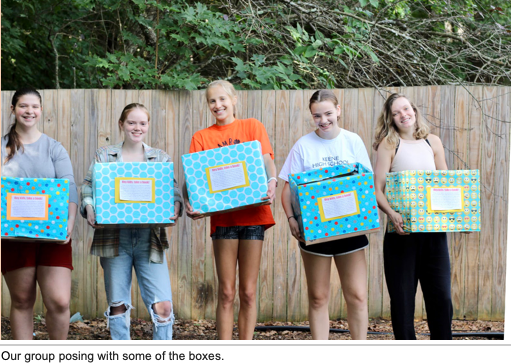
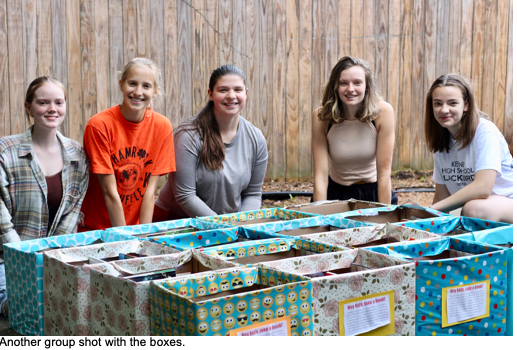
Q. What has the response been?
So far the response to Reading on the Road has been overwhelmingly positive! All of the organizations that I mentioned earlier are incredibly supportive, helpful, generous and give valuable advice. The teachers, in particular, have gone out of their way to voice their appreciation and support of our program. For example, my cross country coach, who is also an English teacher, came up with the great idea of conducting a book drive within my team and allotted practice time to a box-building session! Everyone that we have reached out to has been more than happy to donate and recognize the importance and impact of our initiative on the community.
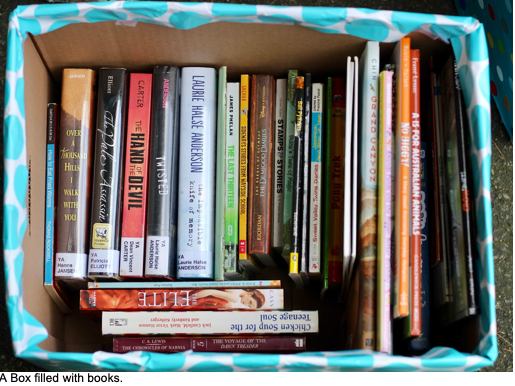
Q. Why do you think reading is so important? How was it influenced your life?
What follows are the responses of myself (Amelia Opsahl), and another member of Reading on the Road, Georgia Gempler.
Amelia’s response: Reading has always been a big part of my life. My mother and grandmother are librarians, and so ever since I was younger I’ve been exposed to an emphasis on the power of reading and lucky enough to have easy access to books. In my own life, reading has been a source of entertainment, imagination, and knowledge, which is why I think it is so important. Not only does a good book provide entertainment that is more intellectually stimulating than watching TV, but it also educates the reader. Whether it be a children’s book or a nonfiction biography (which is, personally, my favorite genre), books purvey invaluable life lessons, knowledge, and creativity to which every child deserves access.
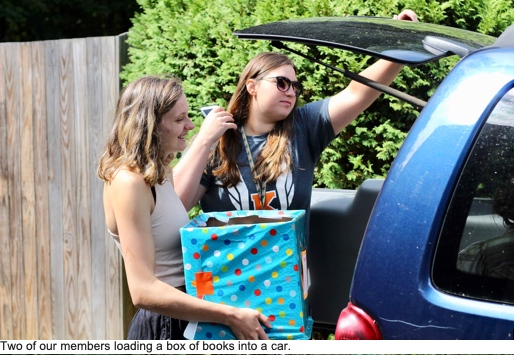
Georgia’s response: I’ve always had a wild imagination. When I was little, I would come up with my own plays and stories to present to my parents and sister. That they marveled at my performances encouraged me to keep going and creating bigger and bigger productions. By the time I learned to read and write, I was so excited that I was able to be able to put my stories on paper and be able to read other people’s, which would inspire more of my own. I guess you could say, I’m more of a writer, but reading is what has truly spawned that love. I ran out of my infinite supply of crazy tales to tell a while ago. What makes it possible for me to continue is how I observe and analyze amazing authors work. By having access to as many books as possible, I have made my love of storytelling a possibility. I’m able to use the skills I learn from the books I read on stage, in my own writing, and in everyday conversation. The more I am able to read, the better I am able to communicate with other people. I think that’s true for a lot of people and that’s why reading is so important to me.
Q. What do you hope students get out of this project?
Above all, we hope that the presence of these books on the buses helps foster a passion for reading in the students. The schools that we service have a population of low-income families in which the children may not have easy access to books of their own and reading may not be a priority of their family. By putting the books on the buses, we hope that these children spark an interest in reading, continue to seek out more books, and develop a life-long love of reading.
Q. Do you have any stories or quotes you’d like to share with us from the program?
As a bus driver who received a box recounted, he once had to save a child from tripping as they were getting off the bus. Why did they nearly trip? Because there were so absorbed in the book that they had picked up that day from the box! I really love this story because it shows how this program really does make a difference by promoting and fulfilling student’s passion for reading.
Q. What’s next for Reading on the Road?
Continue to grow! We currently provide books to the public elementary schools in the Keene School District and fully plan on expanding to outlying towns such as Marlbourough, Chesterfield, and Westmoreland. Additionally, we would like to implement small collections of children’s books in homeless shelters in our area.
Q. Is there anything else you’d like to share?
We are still collecting! Seeing as the kids can take the books home and that we have plans of expansion, we are always seeking new sources of supply. If someone is interested in donating to or learning more about our cause, they can contact our email (readingontheroad.khs@gmail.com) or visit our Facebook (Reading on the Road). We would also like to say a huge thank you to the Children’s Literacy Foundation! Their help has been very conducive to our program and will play a big part in furthering excitement for literacy in our area.



